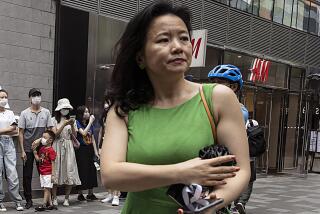China frees artist Ai Weiwei on bail
Reporting from Beijing — After languishing for more than two months in prison without formal charges, China’s most famous dissident artist was abruptly released on bail late Wednesday.
The official New China News Agency reported that Ai had been freed “because of his good attitude in confessing his crimes as well as a chronic disease he suffers from.”
The 54-year-old artist is reported to suffer from diabetes and high blood pressure, although he was not known to be seriously ill. More likely the release was a belated response by Chinese authorities to the international reproach that followed Ai’s arrest April 3 at the Beijing airport.
But it appeared that he would not be able to pursue the biting criticism of the Chinese Communist Party that had permeated his artwork and writing.
“I’m not allowed to talk. I’m on probation,” he said apologetically to reporters and supporters who greeted him about midnight as he returned to his studio in northeastern Beijing.
Dressed casually in a gray T-shirt and appearing in good health, he said his future plans were to “enjoy life.”
“Everybody should enjoy life. I can’t say anything,” he said before disappearing behind the gates to the studio.
Though dozens of others have been arrested over the last six months in a crackdown on activists, it was Ai — by dint of his stature in the art world — who inspired petitions and demonstrations across the world. In London, the Tate Modern gallery installed large black letters across its facade reading, “Free Ai Weiwei.” In New York, a Cuban artist used a slide projector at night to cast the artist’s face onto the Chinese Consulate.
Ai had not been formally charged, although the state media reported that his company, Beijing Fake Cultural Development Ltd., had evaded “huge amounts” of taxes. The New China News Agency quoted police as saying that “the decision [to release Ai] comes also in consideration of the fact that Ai has repeatedly said he is willing to pay the taxes he evaded.”
The wording suggests that Chinese authorities might switch their case against Ai to a civil proceeding, which would allow them to back away gracefully from a situation that has brought great embarrassment. Ai’s attorney, Liu Xiaoyuan, wrote Tuesday night on Twitter that they were still awaiting an accounting from tax authorities of how much money was supposedly owed.
Four of Ai’s associates remain missing, and are presumed to be in secret detention.
His assistant, Du Yanping, confirmed that Ai had returned home and reported with some satisfaction about her plump boss: “He got slimmer.”
Human Rights Watch applauded Ai’s release, adding its own caveats.
“The public announcement of his release signals that the Chinese government has had to respond to international pressure and that the cost/benefit ratio of continuing to detain him was no longer tenable,” Phelim Kine, an Asia researcher with the organization, said in a statement. “Sadly, other Chinese citizens less well-known than Ai Weiwei who have been forcibly disappeared since mid-February remain incommunicado, whereabouts unknown and at high risk of torture.”
Ai, a provocative artist and one of the designers of the Bird’s Nest stadium for the 2008 Beijing Olympics, in recent years had become one of the most acerbic critics of the Chinese Communist Party. Much of his latest work has revolved around the tragedy of thousands of children killed when shoddily built schools collapsed during the May 2008 earthquake in Sichuan province.
More to Read
Sign up for Essential California
The most important California stories and recommendations in your inbox every morning.
You may occasionally receive promotional content from the Los Angeles Times.










